If competitive intelligence has ever felt like something of a mystery to you, I get it. Attempts to “do” competitive intelligence can feel vague, unfocused, and (worse), like a nice-to-have intellectual exercise without a real-world application.
But, when you start to think about it in terms of the questions you need to answer and realize that competitive intelligence is how you’ll find those answers, it’s easy to start to put competitive intelligence to work immediately. Which, frankly, one—feels fantastic, and two—can make you a hero to your entire company.
Yes, finding answers by gathering and analyzing the right intel can prepare your sales, product, marketing, and executive teams to make more profitable decisions and leapfrog ahead of the competitive pack.
If you’re having trouble getting started, try these 25+ questions you need to answer. We’ll even tell you why the answers matter and where to look for them. 🙂
Questions For Sales Teams
Understanding your competitors' unique selling propositions, target customer segments, and objection-handling strategies can help your sales team crush its goals and quotas. Here's what your sales team needs to know.
- What are our competitors’ unique selling propositions?
- Why you want the answer: To refine your pitch and emphasize your differentiators.
- Where to find the answer: Competitor websites, customer reviews, industry trade publications, marketing materials, and industry reports.
- What customer segments do our competitors target?
- Why you want the answer: To compare the segments against your own—and to help refine or expand yours, as needed.
- Where to find the answer: Competitor websites, paid ads, SEO reports, market research, surveys and questionnaires, social media profiles, customer interviews, and online forums.
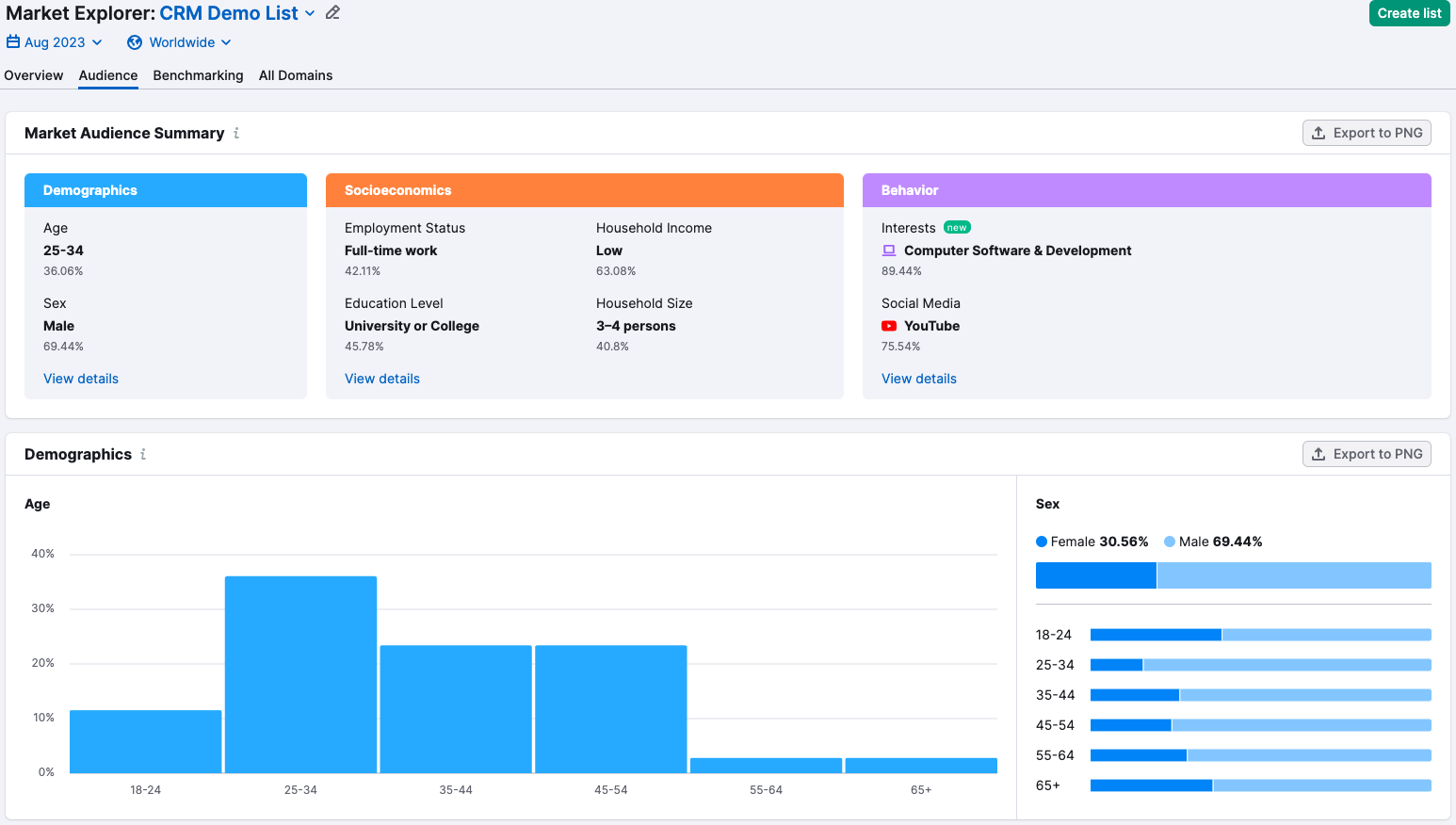
Semrush has a powerful market research tool called .Trends, featuring Market Explorer.
- When prospects are also evaluating our competitors, what objections might they have about our solution?
- Why you want the answer: To better prepare for rebuttals—and, ultimately, close more deals.
- Where to find the answer: Customer interviews, online forums, competitive pages, sales call notes, blog posts, win/loss interviews, and third-party reviews.
- What customer pain points are our competitors addressing?
- Why you want the answer: To discover pain points you’ve overlooked or to capitalize on pain points competitors have missed to improve your sales pitch and materials.
- Where to find the answer: Competitor product and solution pages, social media listening, customer testimonials, and trade show presentations.
- How do our competitors price their products and/or services?
- Why you want the answer: To set a competitive pricing strategy.
- Where to find the answer: Third-party pricing tools, competitor websites, online marketplaces, subscription services, and customer or prospect feedback.
 Kompyte tracks your competitors' online activities, finding changes to key pages, such as product and pricing pages.
Kompyte tracks your competitors' online activities, finding changes to key pages, such as product and pricing pages.
- What discounts do our competitors offer to win deals?
- Why you want the answer: To determine if new pricing strategies or deal structures will help you outperform your competition.
- Where to find the answer: Financial reports, thought leadership, marketing promotions, and sales materials.
Questions For Product Teams
When you answer crucial questions about competitors' features, user feedback, and future development plans, you'll gain the insights needed to shape your product roadmap effectively.
- What key features and functionalities do competitors' products offer?
- Why you want to know: To inform product development decisions and prioritize feature enhancements.
- Where to find the answer: Product demos, competitor webinars, news articles, sales materials, user manuals, and feature pages.
- How do customers feel about our competitors' features?
- Why you want to know: To improve your product roadmap with useful insights.
- Where to find the answer: Social media listening, customer reviews, public online forums, journalist product reviews, win/loss interviews, and customer surveys.
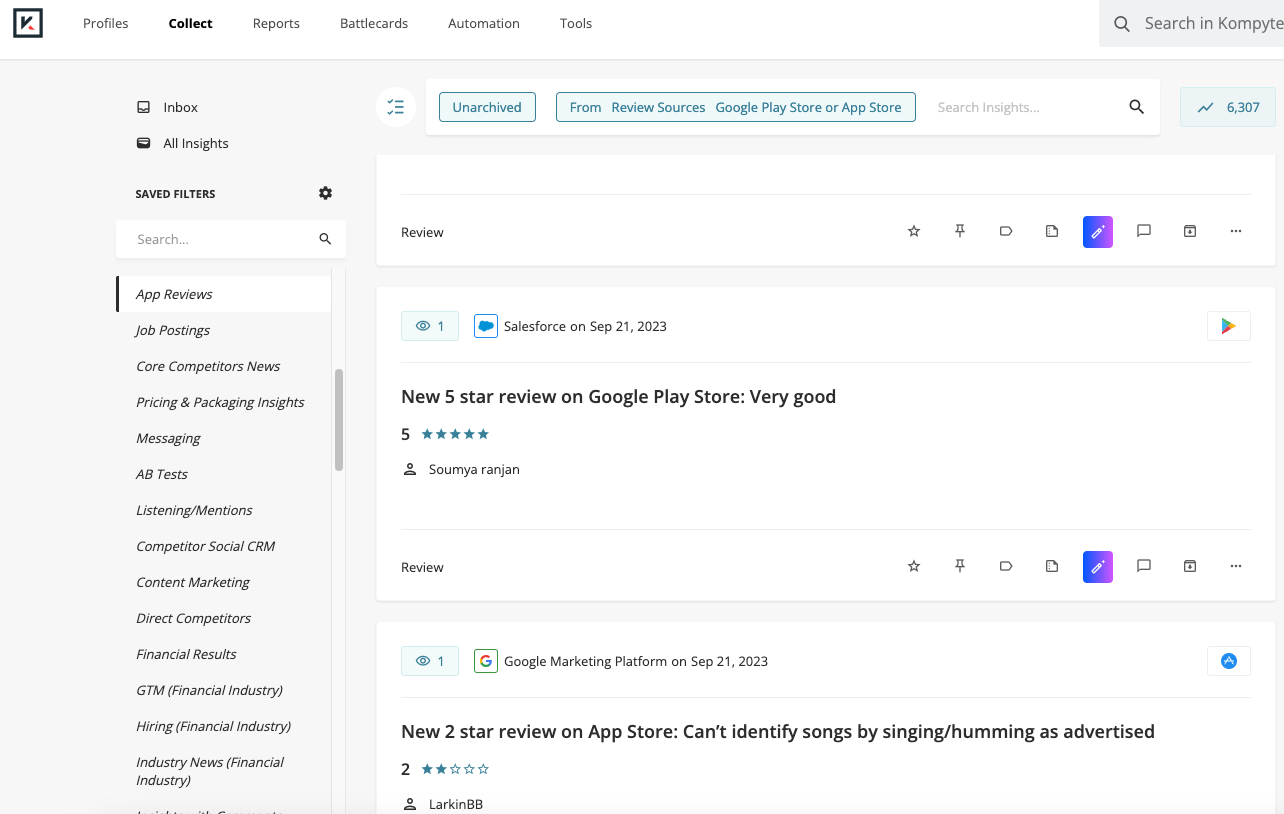 Kompyte surfaces reviews from your competitors' customers.
Kompyte surfaces reviews from your competitors' customers.
- What new features are our competitors developing?
- Why you want the answer: To make strategic product decisions to stay competitive … or build something better.
- Where to find the answer: Competitor release notes, news articles, industry trade publications, sales materials, and patent filings. Watch job postings for clues to new skills/focus areas they’re looking to fill.
- What are our competitors' product user adoption and retention rates?
- Why you want to know: To develop strategies to increase customer loyalty.
- Where to find the answer: Publicly traded companies' reports, marketing materials, third-party reports, executive interviews, and competitors’ social followers count.
- How do our competitors navigate data security and privacy in their products?
- Why you want to know: To bolster your products’ security features and compliance efforts.
- Where to find the answer: Competitor security and privacy pages, terms of service, compliance certifications, regulatory filings, thought leadership, and industry events.
Questions For Marketing Teams
By asking questions about marketing channels, content strategies, customer perceptions, and emerging trends, you'll craft campaigns that stand out and resonate with your audience.
- Which marketing channels do our competitors invest in?
- Why you want the answer: To allocate your marketing budget more effectively or consider new marketing channels.
- Where to find the answer: SEO/SEM rankings, social media profiles, competitor blogs, competitor homepage footer, and marketing awards.
- What is the content strategy of our competitors?
- Why you want the answer: To bolster or individualize your content and ensure your strategy stands out from the rest.
- Where to find the answer: Competitor blog posts, backlink analysis, keyword analysis, gated content, content promotion tactics, and marketing case studies.
- Which of our competitors’ content and strategies drive the most traffic to their sites?
- Why you want the answer: When you know what works for them, you can identify trends, figure out why it works, and make something even better for your audience.
- Where to find the answer: You’ll need Clickstream data for this since you can’t access another site’s Google analytics. Semrush .Trends provides this information.
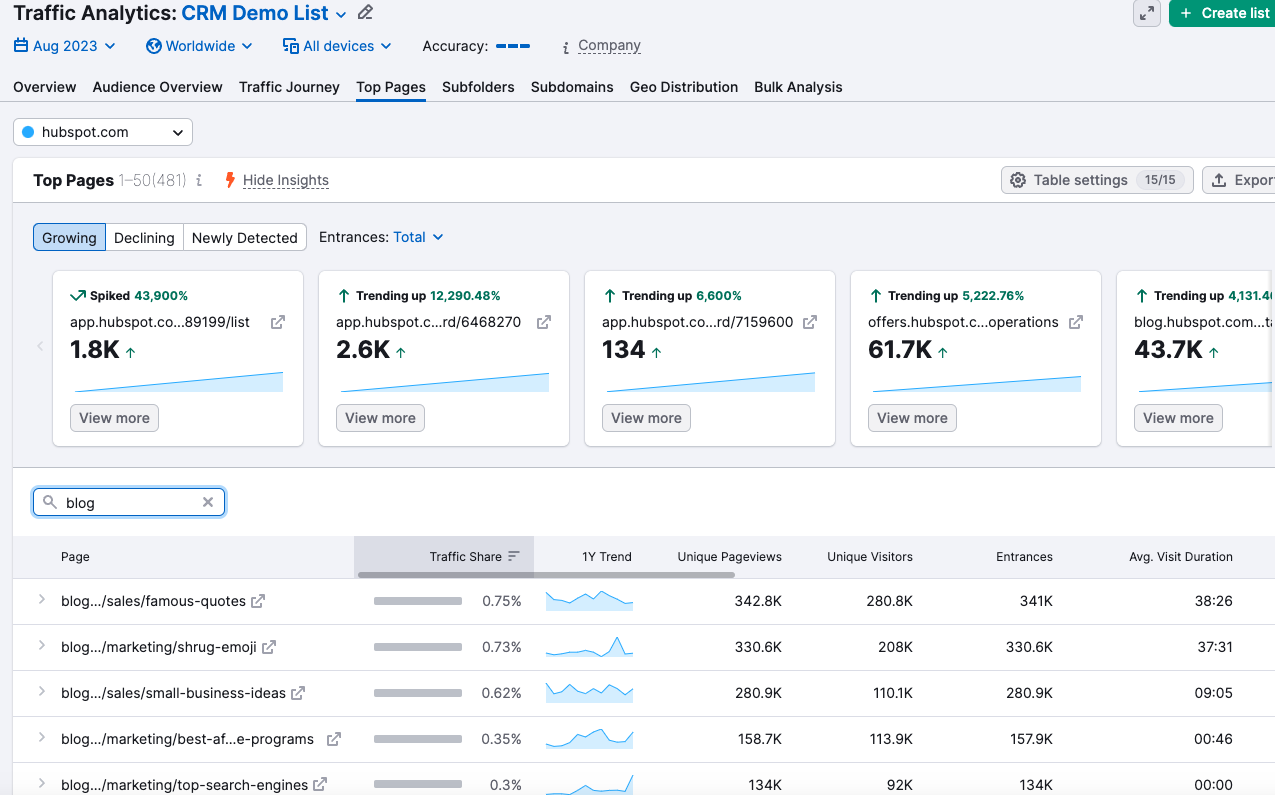
Find out what content works best with your competitors' audience with .Trends Traffic Analytics. Try the free version.
- How do customers perceive our products versus our competitors’ products?
- Why you want to know: To guide product improvements by revealing the strengths and weaknesses of your products compared to your main competitors.
- Where to find the answer: Customer surveys, online ratings, competitive benchmarks, social media listening, user testing, and customer churn analysis.
- What messaging do our competitors use?
- How do competitors use data and analytics to optimize their marketing efforts?
- Why you want the answer: To improve how you use data to improve your marketing efforts.
- Where to find the answer: Industry conferences, competitor webinars, thought leadership, research reports, and marketing materials.
- What marketing campaigns from competitors are customers gravitating toward most?
- Why you want the answer: To inspire ideas for upcoming marketing campaigns.
- Where to find the answer: Social media engagement and public analytics, ad campaign analysis, advertising and marketing awards, and SEO analysis.
- What keywords are competitors targeting?
- What global or regional marketing strategies do our competitors employ?
- Why you want the answer: To improve how you market to specific regions or gain insight before moving into new markets.
- Where to find the answer: Multilingual websites, local events, industry panels, local partnerships, customer reviews, advertising campaigns, and SEO reports from other countries or in other languages.
Questions For Executive Teams
Get answers about market share, new players, customer sentiment, emerging threats, and talent landscapes to guide your organization toward sustainable growth and success.
- What is the market share of our competitors?
- Why you want the answer: To understand how much market share each of your main competitors holds and how it compares to your own share.
- Where to find the answer: Market research firms, industry reports, government and regulatory agencies, and trade associations.

.Trends Market Explorer shows you the whole picture and where you and your competitors fit in to the competitive landscape.
- Which markets are our competitors entering or exiting?
- Why you want the answer: To analyze new opportunities or threats.
- Where to find the answer: Press releases, job postings with geographic locations, trade publications, and competitor financial statements.
- What do our competitors’ customers say about them?
- Why you want the answer: To analyze new opportunities or threats.
- Where to find the answer: Social media listening, third-party customer reviews, case studies, and testimonials.
- What are our competitors’ plans for the future?
- Why you want the answer: To re-evaluate the competing market and to initiate possible M&A activity, funding, and hiring
- Where to find the answer: Financial news outlets, press releases, job sites, social media, SEC filings, stock market activity, trade shows, and industry word-of-mouth.
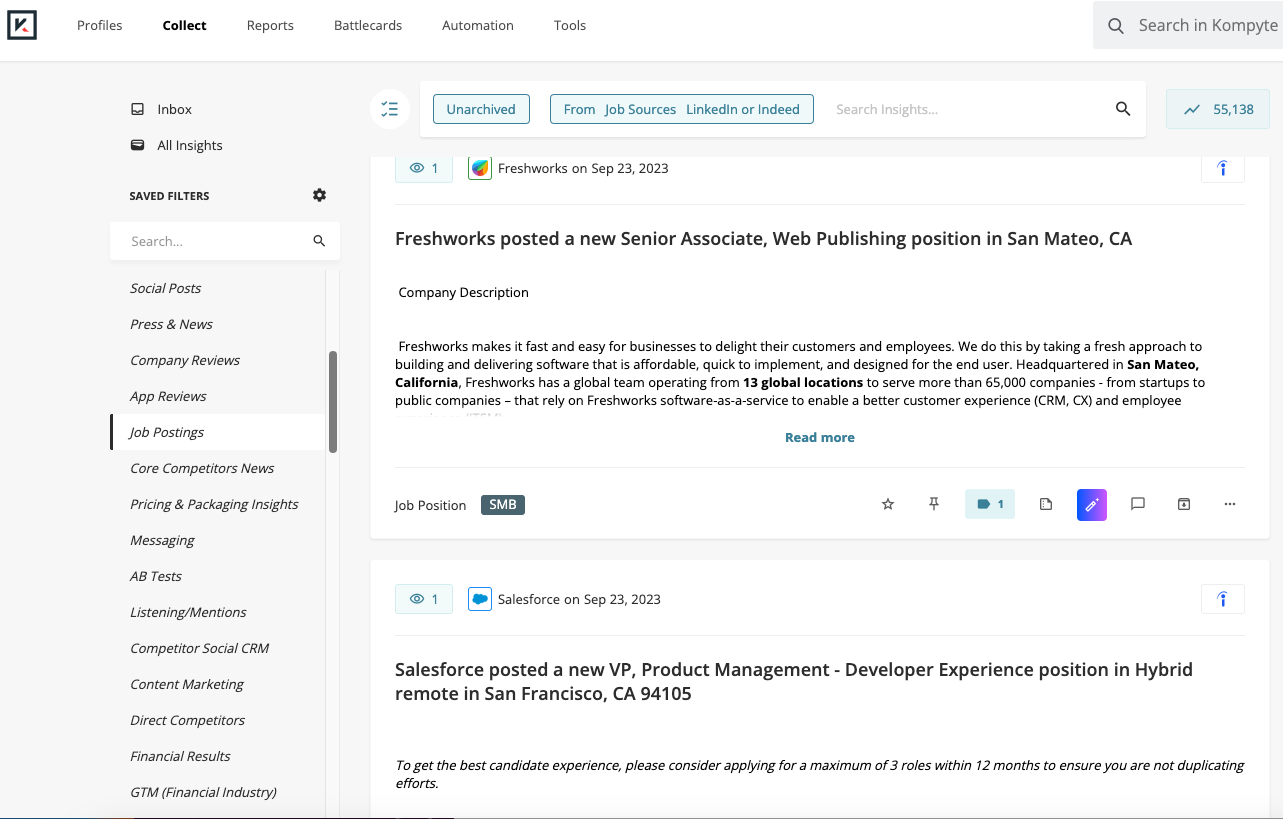
Kompyte surfaces job postings from your competitors.
- Are there potential disruptions or threats on the horizon?
- Why you want the answer: To prepare and adapt accordingly.
- Where to find the answer: Compliance changes, expert interviews, geopolitical events, financial analysis, and industry news.
- What are the emerging trends in the industry?
- Why you want the answer: To stay ahead of your competition.
- Where to find the answer: Industry reports, trade journals, industry conferences, innovation centers, venture capital activity, innovation awards, and thought leadership.
- What is the competitive landscape for talent?
- Why you want the answer: To help inform your talent strategy regarding recruitment and retention.
- Where to find the answer: Job boards, LinkedIn profiles, Glassdoor reviews, online forums, networking associations, and workplace awards. Pay particular attention to factors such as salary range, number of applicants, and the length of time jobs are open.
- What are key partnerships that our competitors have formed?
- Why you want the answer: To identify potential collaboration opportunities or assess competitive threats.
- Where to find the answer: Press releases, competitor blogs, industry events, social media monitoring, trade journals, and market research reports.
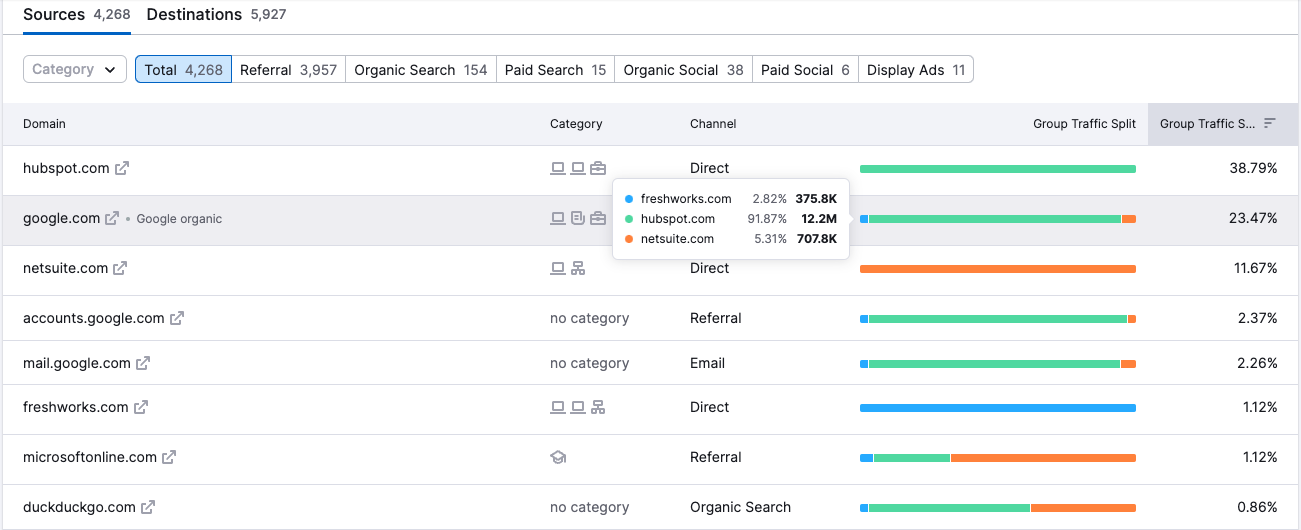 .Trends helps you pinpoint competitors' valuable traffic sources and partnerships.
.Trends helps you pinpoint competitors' valuable traffic sources and partnerships.
Pro Tip on Gathering Answers with Competitive Intelligence
Don’t think you can find Everything Everywhere All At Once to answer these burning business questions? It’s true, you may not need it all today, and you may not have time to keep your findings up to date on an ongoing basis.
Which is why you might consider competitive intelligence automation. Kompyte pulls the latest data from 500 million data sources into an easy-to-read and filter Collect feed so you can find exactly what you want when you need it.
And remember, competitive intelligence is only useful if someone uses it!
Creating easy-to-reference Reports, Battlecards, and alerts that pop up right where the user needs them is key to achieving adoption and maintaining support for your competitive intelligence program.
And now that you know just how many questions you can answer with it, you’ll want to keep your competitive intelligence program running!
.gif?width=607&height=344&name=battlecard-in-salesforce%20(1).gif)
Staying one step ahead of your competition is easy if you seek intelligence that answers the right questions.
When you answer these questions, you can help sales, product development, marketing, or the executive team make smart decisions that lead to success for their teams and the company as a whole.
Here's a final question for you: Why wait?


 Kompyte surfaces reviews from your competitors' customers.
Kompyte surfaces reviews from your competitors' customers.
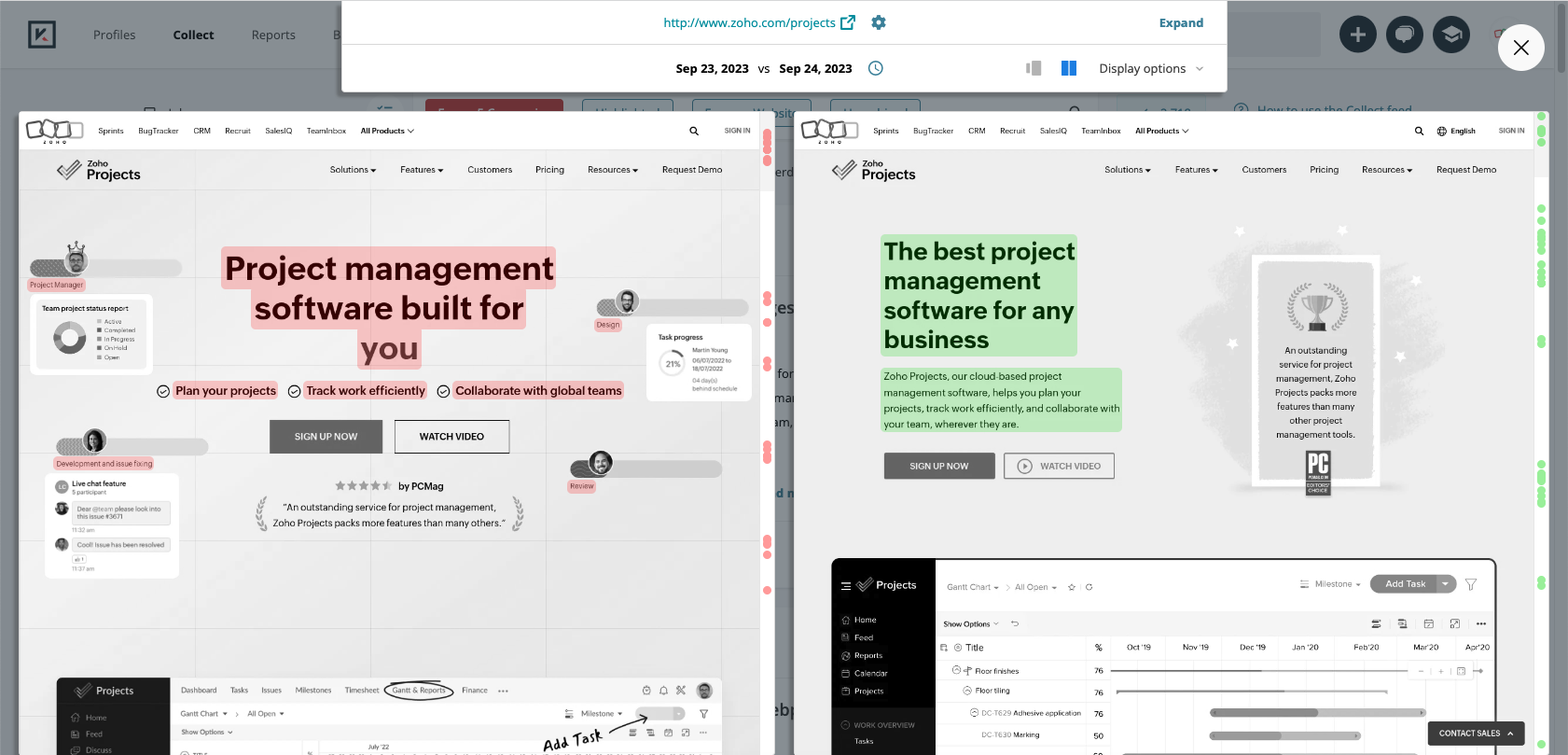
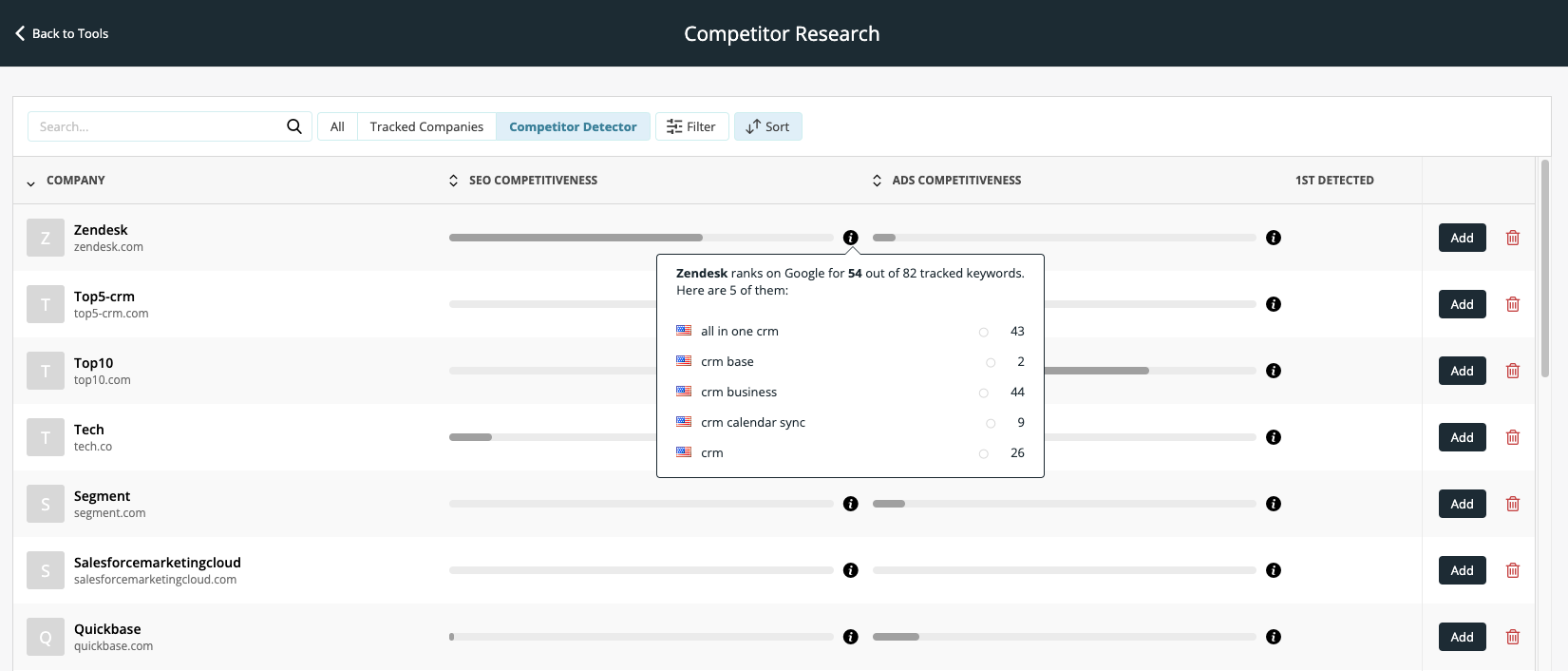


.gif?width=607&height=344&name=battlecard-in-salesforce%20(1).gif)